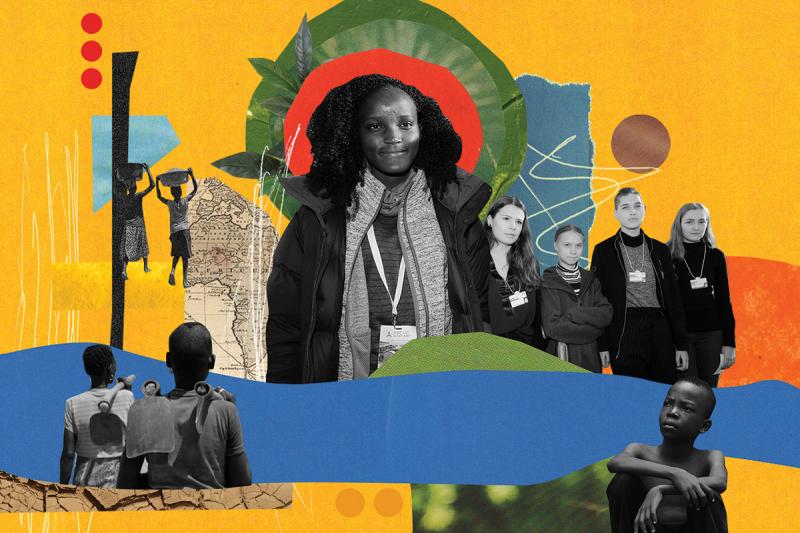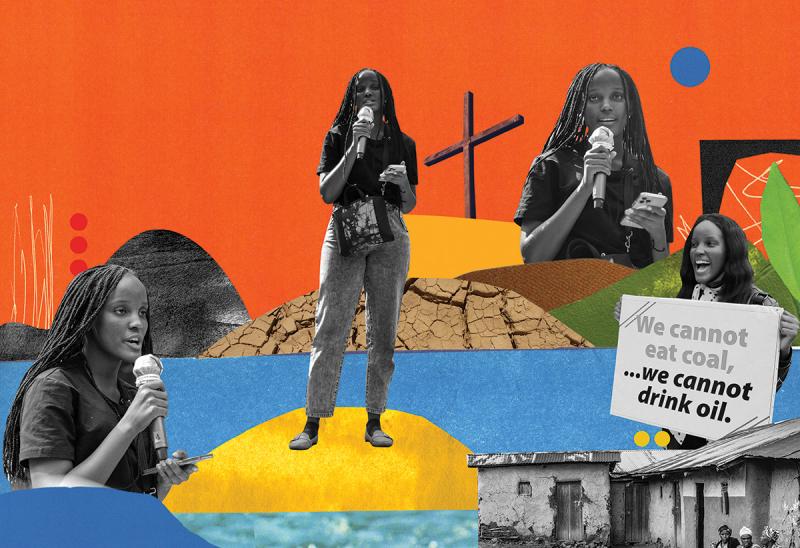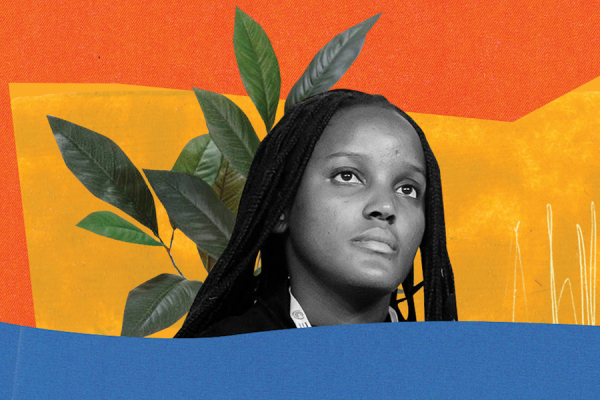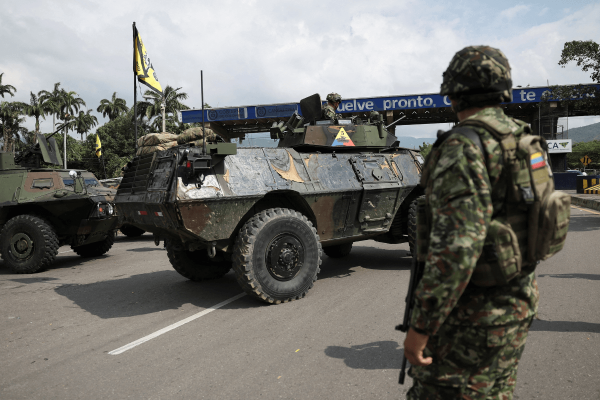THE IMAGE THAT first brought Ugandan climate activist Vanessa Nakate to many people’s attention is one that doesn’t even include her.
In January 2020, Nakate was invited to join five other young activists in a climate demonstration during the World Economic Forum annual meeting in Davos, Switzerland. An Associated Press photographer snapped a photo of Nakate standing with European climate activists Luisa Neubauer, Greta Thunberg, Isabelle Axelsson, and Loukina Tille. But when the AP published the photo that afternoon, Nakate wasn’t in it.
“Even now, well over a year after being cropped out of that photograph, it’s hard for me to talk about what happened,” wrote Nakate in her 2021 book A Bigger Picture: My Fight to Bring a New African Voice to the Climate Crisis. “By cutting me out of the photo they’d originally sent to global media organizations, the AP had denied an African activist a chance to be seen and, possibly, her message to be acknowledged.”
While the AP did some “soul-searching” following the incident, Nakate used the moment to ignite an overdue conversation about the whiteness that has long plagued the global environmental justice movement. “Being cropped out of the photo changed me,” she wrote. “I decided, from my perspective as a young African woman, that I would dedicate as much of my time as possible to addressing the many interlocking facets of the climate crisis, environmental justice, and gender discrimination — and to do so without apology or fear of erasure.”
Nakate founded the Rise Up Movement to amplify the voices of climate activists from Africa and launched a fundraising campaign for the Vash Green Schools Project to bring solar panels and cookstoves to schools across Uganda. At 25, she’s busy. And faced with a global climate emergency, it makes sense. “I don’t often get asked what recharges me,” Nakate told me when we spoke in early August. “But for me, it’s my relationship with the Holy Spirit.”
Raised in an Anglican family, Nakate became a born-again Christian as a teenager. “Activism can be very hard and prayer and attending services (or, in Covid times, watching online) have been extremely important sources of love, grace, and support,” she wrote in the acknowledgments of A Bigger Picture.
“If I feel distraught or disturbed by anything, I know the Holy Spirit will remind me of the peace that surpasses all human understanding,” she later told me. I spoke with Nakate via Zoom about her Christian faith, the role social media plays in her activism, and why we can’t eradicate poverty without addressing the climate crisis. — Christina Colón
feature.nakate.spota.jpg

Christina Colón: One thing I love about A Bigger Picture is that you write of your family and home in Uganda and the ways climate change and your climate activism have impacted both. What is the value of engaging your community in climate activism?
Vanessa Nakate: When it comes to the conversation about the climate crisis, it’s important for people to know that climate change is more than weather. It’s more than statistics. It’s more than data points. It’s about the people. So that’s where community comes in. That’s where family comes in. To really understand what the climate crisis is beyond the statistics that are being given is to understand what happens to the people in your community. The climate crisis escalates what happens to your neighbor. To give an example, the farm that we have in the village has dried up because of extreme heat. The climate crisis could be very near or very close to you, and it could be affecting someone in your family or someone in your neighborhood.
For the people of faith who want to do something about this, I think, first of all, it’s a place of understanding that a fight for climate justice is a fight for God’s creation. Many times, people of faith want to do what pleases God — and it is in these things, restoring and reconciling creation back to God.
How does your faith inform your climate activism and, likewise, how does your climate activism inform your faith?
My faith plays a huge role in my activism. People ask what gives us hope as activists and if there is any hope for what we are fighting for. In my Christian faith, I understand that “faith is the substance of things not seen and the substance of the things that we hope for” [see Hebrews 11:1]. Even when I haven’t seen that world yet, there is a faith that gives me a substance of that world. That hope really springs from my Christianity. Another aspect is an aspect of creation itself. We know that Jesus Christ is “the firstborn of all creation” [Colossians 1:15], and we generally understand the planet and the environment is all creation. So, if Jesus Christ is “the firstborn of all creation,” that means that he is a part of creation. He is creation itself. We even see it when Jesus feeds about 5,000 [people]; he tells his disciples to gather what is left over [see Matthew 14:13-21] because God is not a God of waste. Even when there is abundance, God will ask you to collect it because it can still be eaten the following day or by another group of people.
You talk honestly about the issues you once didn’t know about — such as the destruction of the Congo rainforest — because of the media’s focus on the developed world. How do you learn about such issues, and how can communities of faith play a role in changing a narrative that too often focuses only on wealthy countries?
Many times, the resources are actually with the activists themselves that are already organizing. It’s important to listen to those that are on the front lines and to really amplify their voices because you’ll understand that, for example, the Horn of Africa is experiencing a drought that has left over 20 million people without access to food. [Those on the front lines] have the resources about what is really happening. In faith groups, it’s a place of seeing that there is a problem and saying, “We need to do something about it. We all need to work together.” And when we do that, we can transform this world and make it a better place for all of us.
Social media lifts and amplifies the efforts of climate activists, but you’ve noted that it can also become a magnet for shaming and disinformation. What role does social media play in your activism today?
When I started in 2019, most of the work that I was doing, especially the climate strikes, I would share on social media, and people would share what I had posted. It connected me to that community that is advocating for a better world for all of us. But with the negativity that has come with it, personally, I have always chosen to look at the bigger picture of what I’m fighting for and the benefits of using social media. Those who are against you are one or two people, yet those who are fighting along with you, they are hundreds or thousands. I always pay attention to those who are supporting what I’m working on.
Climate change can only be effectively addressed if the solutions engage racial and gender justice too. Why is it important that we work from the interconnectedness of these issues?
The climate crisis escalates many issues that we see in this world. We can’t eradicate poverty without addressing the climate crisis, because as people lose their farms, their businesses, or are forced to move, they’re left with nothing. It creates poverty traps. And we see the impact on education when schools are flooded, and kids cannot go to school. When communities are experiencing drought, it shows how kids cannot study when they’re hungry. When climate disasters escalate in certain communities, women have to walk long distances to look for water. Girls have to drop out of school. Some are even forced into early marriages as their families expect a bride price. Climate change is more than statistics. We need to look at what actually happens to the people, what happens to women, what happens to girls, what happens to communities when these disasters happen. When we bring in the conversation of the people, there comes in gender equality, there comes in poverty, education for all — so it’s really a place of knowing that it’s not just a fight for one thing, but it’s a fight for so many things.
feature.nakate.opener.jpg

You make it clear that we are not experiencing “climate change,” but rather a “climate emergency.” What is the distinction?
Many times, when we say climate change, people think that it’s something that is coming in the future, and not something that is happening right now. But when we talk about the climate crisis or when we say this is a climate emergency, it shows that this is something that is happening right now. Climate disasters are escalating right now. If we say that droughts are happening or cyclones and floods, it’s evident because you can see the droughts in the Horn of Africa, you can see the flooding in East Africa, you can see the cyclones in Southern Africa. When you go to schools and ask students what they understand about climate change, they will tell you that it’s the average change of weather conditions over a long period of time. That definition doesn’t actually talk about the urgency. It wouldn’t make someone think that we are in a crisis. But when we say the “climate crisis” or “climate emergency,” it emphasizes the reality of what is happening in so many communities right now.
That we can see these floods, cyclones, severe droughts, and unprecedented heat happening around us leaves me feeling disoriented, frustrated, even stuck sometimes. How do you keep going?
I always prioritize rest. And rest will come in a number of ways for different people. But for me personally, when I am not doing activism, I am most likely at church in service or helping to organize or to mobilize at church. There is a place of comfort. There is a place of peace. There is a place of joy or restoration when I am in church. That is where I find my rest. It’s important for people to find what rest really means to them and to do that because activism can be very hard and can cause burnout if you don’t take care of yourself.
Some church communities say changes in global climate patterns are “God’s will” or that “God has it under control.” How do you respond to people of faith who say this is God’s problem, not ours?
What I know from scripture is that God wills for us to prosper even as our souls prosper. Within our souls, that’s where our health lies. And what we see the climate crisis do to so many people — for example, today I shared a statistic about air pollution and how many people are being impacted. If it is causing people to fall sick, how is that the will of God? How is that the will of God if it is destroying people’s lives? The Bible says birds can find something to eat. So how is it that the birds can find food, but people are not able to find something to eat? It’s not the will of God that anyone falls sick. It’s not the will of God that anyone is destroyed. The Bible says that “the thief comes only to steal, to kill, and to destroy” [John 10:10]. Anything that is stealing, or anything that is killing, or anything that is destroying, that is the will of the enemy. That is not the will of God.

Got something to say about what you're reading? We value your feedback!







